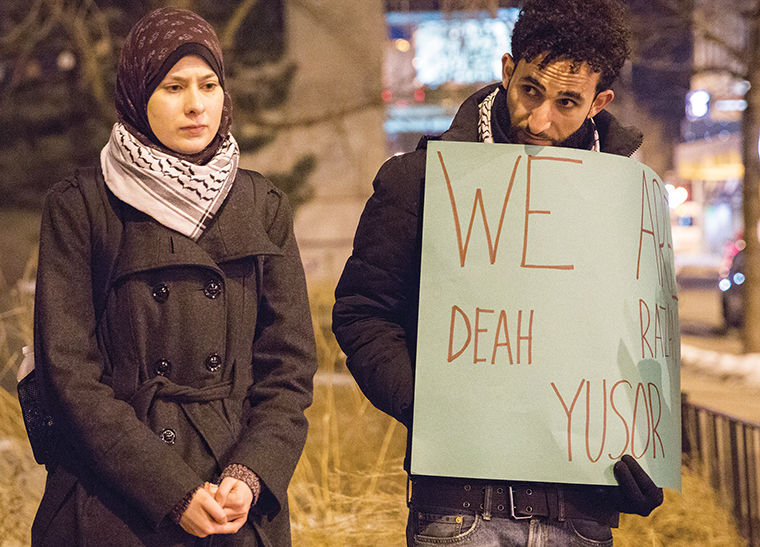Responsive vigil for UNC shooting addresses Islamaphobia
Dania Mukahhal, a senior art + design major, and Ahmed Hamad, a 2014 alum, came together to hold a vigil with citizens and students on Feb. 11, at the Sculpture Garden, on the corner of South Wabash Avenue and 11th Street, after news of the brutal shooting that killed three Muslim students.
February 16, 2015
In response to the three Muslim students who were shot and killed on Feb. 10 near the University of North Carolina at Chapel Hill, a vigil was held in the Sculpture Garden, on the corner of South Wabash Avenue and 11th Street, on Feb. 11.
Columbia students and other Chicago-area residents attended the event at which organizers distributed fliers to raise awareness of the victims’ deaths and to combat Islamaphobia—a prejudice against the religion of Islam and ethnic groups perceived to be Muslim.
Dania Mukahhal, secretary of the college’s Muslim Student Association, a senior art + design major and organizer of the event, said she was disturbed by the UNC incident and wanted to help increase awareness on Columbia’s campus and throughout the city about the bigotry that Muslims face.
“I was overcome with a wave of emotion [when I found out],” Mukahhal said. “At first I was in denial. I couldn’t believe that this happened and then I was really angry.”
Mukahhal said the vigil was successful in lending support to students and giving them a platform to express their thoughts about the incident. She said it is important for students to be informed about current events because students are the future.
“In the future, we are going to be the ones handling situations like this,” Mukahhal said. “Making students aware will make them more culturally and politically aware when they go out in the field or when they cover something or they put something together as an artist, they can be conscious of what they are doing and won’t silence anyone in any way. As artists, we do have a lot of power.”
Husam Marajda, a sophomore computer science major at DePaul University, said he attended the event to show support and help spread the message that all lives have value.
“I came out here because every human life matters to me and should matter to everybody,” Marajda said. “I’m sick of the racism.”
Marajda said he is unhappy that mainstream media outlets have neglected to give the shooting adequate coverage, adding that if the shooter had been Muslim and the victims had been white, it would have been more widely broadcast.
“When a white person does something, he’s just labeled as mentally ill,” Marajda said. “But if a black person does it, he’s a thug. If it’s a Muslim, he is a terrorist. I’m just sick of that unfair labeling.”
Ava Ginsburg, a senior cinema art + science major, shared similar sentiments with Marajda and said she is unhappy with the media coverage of the UNC incident because it has not been appropriate or accurate.
Ginsburg said the attitude toward Muslim students on Columbia’s campus is hard to gauge because the college is fragmented as a result of its urban campus. However, she said it is important for students to be educated on such topics because they can impact students’ art and other forms of expression.
“[The shooting] was a triple murder, and it’s obviously racist and political in its message,” Ginsburg said. “These kinds of current events and the suffering that goes on in the world can [affect] a lot of the art we create, especially with film and documentary making.”








